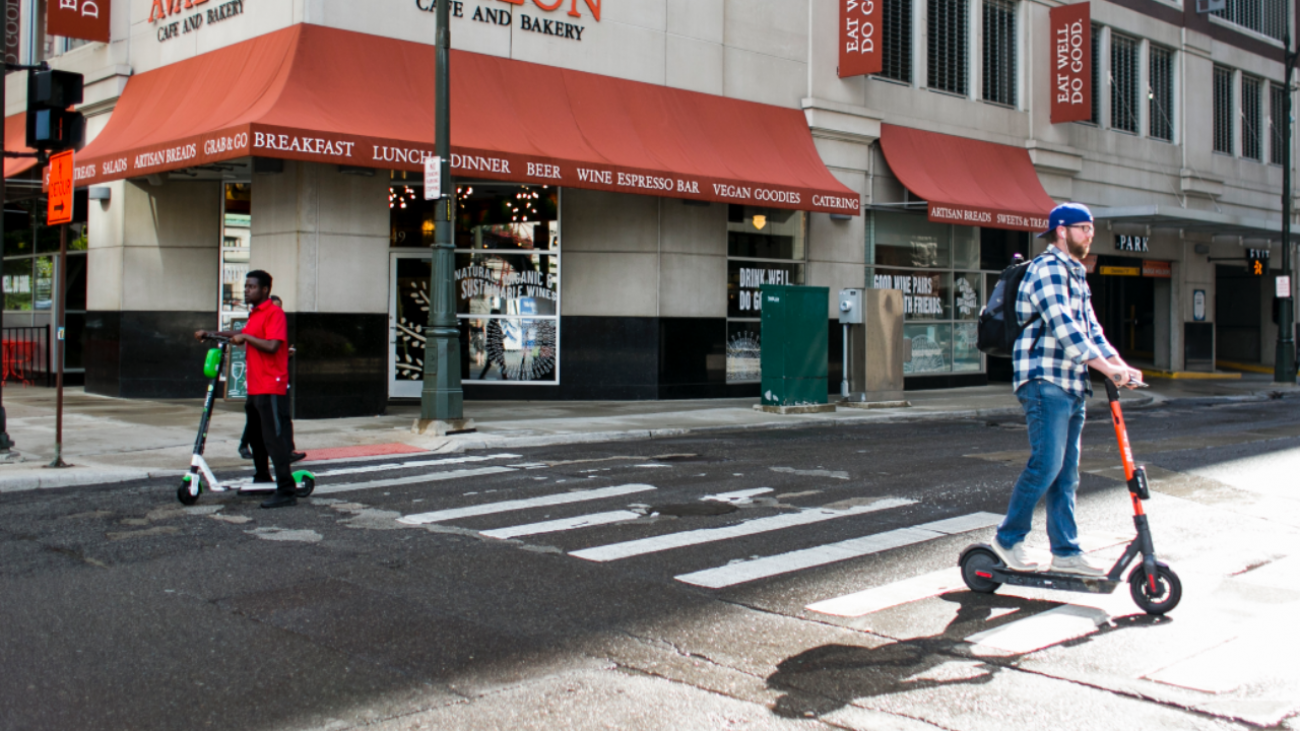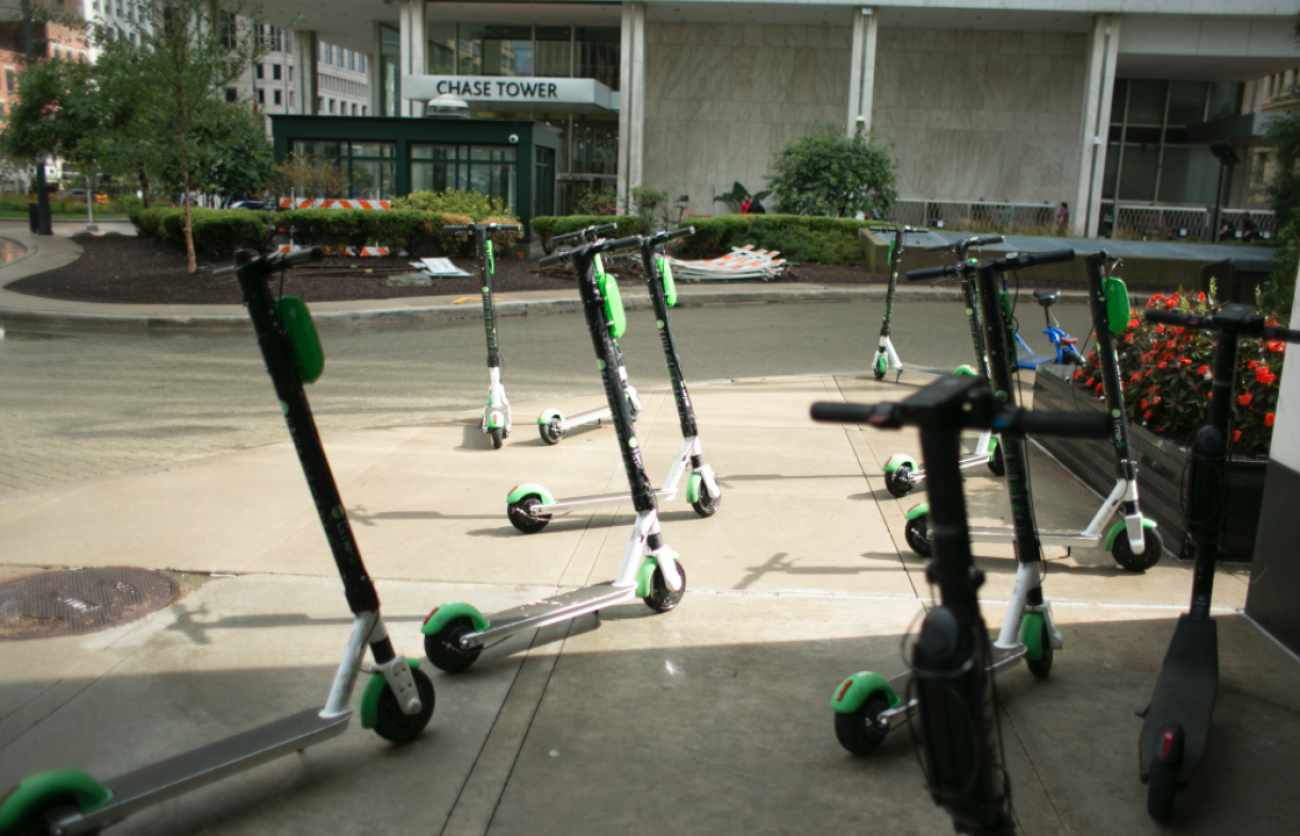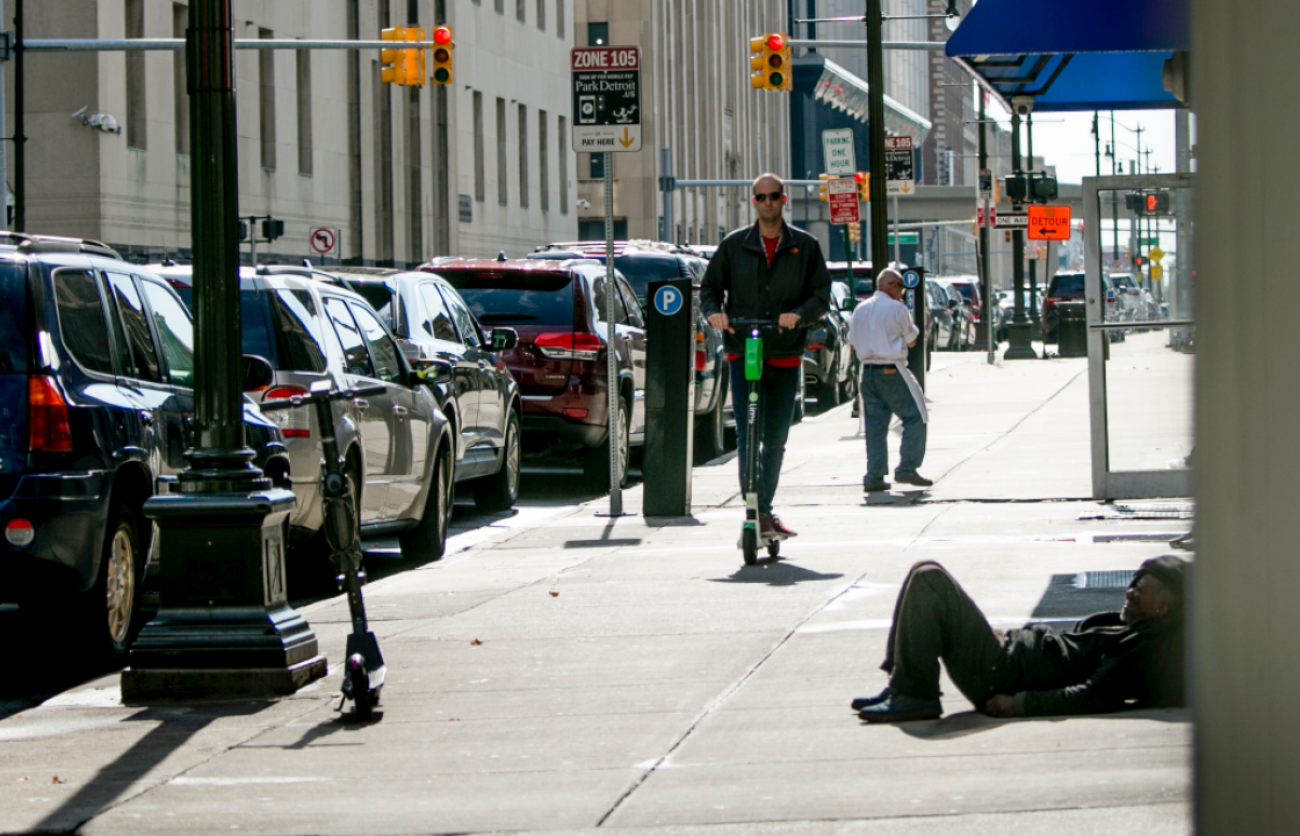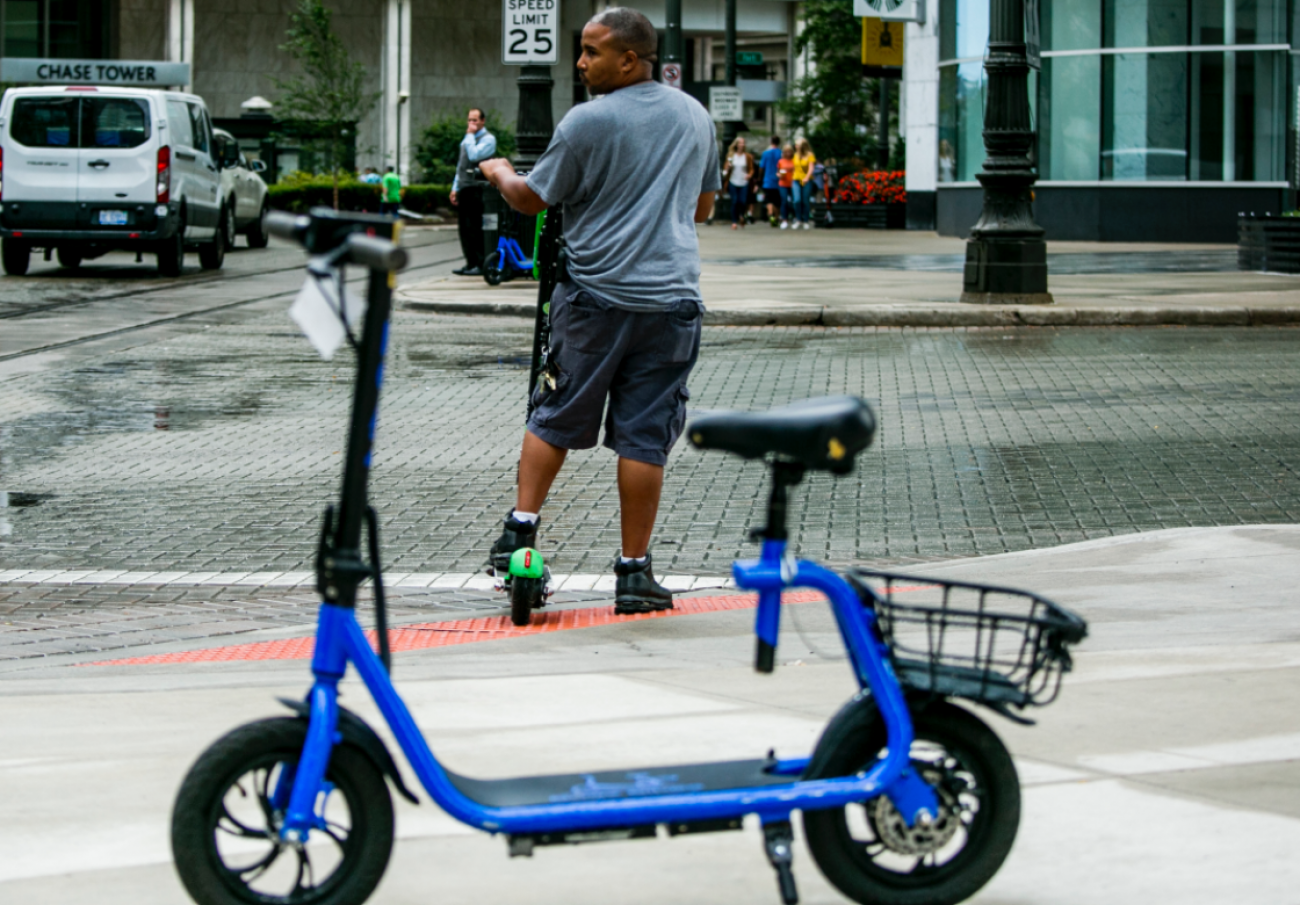E-scooters are fast, unregulated and all over Detroit. What could go wrong?

DETROIT – At 25 years old, Idrees Mutahr seems the epitome of the millennial professional, moving into the city from Dearborn earlier this year. He has no car, relying instead on the city’s limited bus service, QLine trolley and, from time to time, Detroit’s new “micromobility” craze: dockless scooters.
The scooters — essentially electric skateboards with handlebars that can cruise up to 15 mph at the touch of a button — have helped Mutahr stay on schedule, even when the bus runs late.
“What the scooter has done for me is filled in a lot of the gaps left by the transit system,” said Mutahr, who has a fellowship at the Detroit Regional Chamber and lives in the New Center neighborhood.
“I don’t have a car as a backup if I need to get somewhere quickly and don’t have 15 minutes to wait for a bus, especially for those neighborhood routes. It has quite quickly become just another option to get around the city.”
The speedy conveyances are rented by companies such as Bird, Lime, Spin and Boaz Bikes. They’re accessed by smartphone apps that allow users to locate a scooter and pay about 15 cents per minute to ride until parking it for the next user. The scooters have become ubiquitous since they were introduced last year, as riders zip about on sidewalks and bike lanes or leave them parked outside bars, businesses and museums.
Related stories:
- Down for so long, can Detroit remember how to include neighbors in growth?
- Thanks for making Detroit cool, artists. Here’s your eviction.
- Whites get half of mortgages in Detroit, nation's largest majority-black city
- Poverty is Detroit's biggest problem. Gentrification doesn't come close
- Is Detroit finally turning the corner? Or is gentrification a problem
Rolled out in cities across Michigan and nationwide, the scooters are fun, fast and inexpensive for users like Mutahr. They’re a source of anxiety and annoyance for pedestrians dodging them on sidewalks and some city officials puzzled by what laws govern them, provoking bans and impounds in Ann Arbor and East Lansing.
In a rapidly changing Detroit, the scooters have become something else: a symbol of tension about whether the city belongs to newcomers or longtime residents. In a city with chronic problems, the service that appeals mainly to young professionals was rolled out so quickly and with virtually no regulations that a City Council analyst last year wrote that Detroit was “inundated.”
The results have often been confusion, annoyance, anger and broken bones as scooter users have shown up by the dozen at Detroit emergency rooms.
With everything going on in the world, why have I chosen to get so pissed off about scooters?”
-- Kristin Palm, a Detroit resident and writer
“With everything going on in the world, why have I chosen to get so pissed off about scooters?” asked Kristin Palm, a Detroit resident and writer, who acknowledged she’s preoccupied with scooters.
After some consideration, she offered an answer.
“It’s the entitlement of the companies and the way they use our public space for profit and somehow get to forgo all the considerations the rest of us are rightly expected to observe, like keeping spaces clear for both aesthetic and safety reasons,” Palm told Bridge Magazine.
Mark de la Vergne, Detroit’s chief of mobility innovation, said Mayor Mike Duggan reached out to the scooter companies in spring 2018 and invited them to Detroit after seeing them in other cities such as San Francisco, Los Angeles and Washington, D.C.
“Any time you bring change in, change can be hard, but what we tried to do is listen to folks, both on how they see scooters as another mobility option that can solve an issue and also some of the challenges with them,” de la Vergne said.
A bumpy ride
Scooters may be seemingly everywhere, but their rollout in more than 100 cities nationwide since 2017 hasn’t always been smooth, in part because they often appear without warning or input from residents and government officials.
“These new mobility options are causing significant upheaval,” Ron Brundidge, Detroit’s public works director, wrote in a memo last year that explored ways to deploy local ordinances to avoid the scooters being a “public nuisance.”
Public agencies, the memo warned, struggle “to get out ahead of venture capital-funded disruptive technologies for which existing regulations are either inapplicable, inadequate or inappropriate.”
The responses have[ been anything but uniform. Detroit and other city governments such as Chicago welcome the companies, but, this year, Chattanooga, Tennessee, issued a six-month ban on them, while Nashville reduced scooter fleets and limited operation hours.
In Michigan, Ann Arbor last year threatened parking tickets and began impounding improperly parked Bird scooters, eventually ending their contract with the company. Birds still tool around Hamtramck, in contrast, even though the city has no contract with the company, said Kathy Angerer, city manager of the Detroit enclave.

One big issue is electronic scooters exist in a foggy legal area between cars and bicycles. Officially regulated under the newly amended Michigan Vehicle Code as “electric skateboards with handlebars,” awareness of the laws is almost as nonexistent in Detroit as enforcement.
Detroit officials weren’t even sure where in the road scooters belonged until an advocacy group, the Detroit Greenways Coalition, confirmed with state officials that they could be driven on bike lanes and sidewalks, so long as they don’t disturb pedestrians who have the right of way.
Rayman Mohamed, a Wayne State University professor of urban studies and planning, said the absence of accepted rules about scooters fuel tensions.
“At least there are rules of the road that cars generally follow,” said Mohamed, who occasionally uses a scooter himself. “And, for the most part, both pedestrians and drivers have a common understanding what those rules are.
“I think with scooters we haven’t had time to come to a common understanding about those rules. Instead, the rules are ambiguous and that leaves lots of room for animosity between pedestrians and scooter users.”
Complaints about scooters whipping by pedestrians along the Detroit RiverWalk prompted the city this summer to ask the companies to institute a “geo-fence” along the riverfront. That forces the Limes to slow to 5 mph at the park, while the Birds come to a stop.
Among other issues, scooters are “left abandoned in the middle of sidewalks” and “scooters left in front of building entrances and exits, and blocking handicap access ramps,” according to a memo last fall to the Detroit City Council.
De la Vergne, the city’s mobility chief, said the companies are “really good partners” and “good at responding to issues we have.”
“This isn’t just a Detroit issue,” he said. “We’ve been trying to work with companies to improve technology so they are able to get the users to park the devices correctly.”
Bird allows users to report irresponsible behavior on its app, while Lime asks users to take photos of properly parked scooters after rides. Many downtown buildings, including the one de la Vergne works in, have designated scooter parking areas. The city also advises scooter users to leave them near bike racks, though they’re often in short supply.

Megan Owens, a transportation advocate, supports the scooters as a small improvement to a region that has the nation’s worst mass transit system. Even so, she said she wishes the city had sought input from the public about “what’s working and what’s not.”
“The public absolutely must have a voice in how public right of way is used,” said Owens, executive director of Transportation Riders United, a Detroit nonprofit that advocates for public transit.
“The scooters should be a part of that.”
She said problems with abandoned scooters remain but have improved somewhat in the past year. Like Owens, Todd Scott, director of the Detroit Greenways Coalition, urged critics of scooters to keep them in perspective.
“We have issues with cars parking on the sidewalk, cars parking in the bike lane,” said Scott, whose group advocates for greenways and bike lanes and who serves on the city’s Electronic Scooter Task Force. The group, convened last year, has only met once.
“And we’re still dealing with bigger things that that: We have pedestrians dying in car crashes every year. We need to focus on the bigger safety issues.”
A study this year by the National Complete Streets Coalition deemed Michigan the 19th most dangerous state for pedestrians, and Detroit-Warren-Dearborn the 18th most dangerous metro area.
That said, scooters have significant issues in their own right, causing serious injuries in Detroit and nationwide. At least one Detroit hospital reports 10-20 injuries per month.
A free-for-all
The swift introduction of scooters in Detroit contrasts with another micromobility effort: MoGo, Detroit’s nonprofit bike-sharing service, which launched in May 2017.
MoGo Executive Director Lisa Nuszkowski said she started seeking intensive input into the service years before launching, a “high-level approach” that engaged residents, the business community, nonprofits, and every government that administers roads in Detroit, including Wayne County, regional planning groups, the state of Michigan, and the city itself.
“We went through the whole process,” Nuszkowski said. “Getting feedback from the people on the ground … that really helped us better understand what was going on and how to make this service help meet some of those needs.”

Unlike civic-minded services like MoGo, the exuberant “micromobility revolution” isn’t driven by transportation geeks or cyclists but by venture capital-funded technology companies in a mad scramble for supremacy.
“It’s not just scooters — it’s part of this whole mobility area,” said Scott, the greenways advocate.
“We’ve got a lot of people coming in from the technology sector into micromobility arena, and they aren’t aware of the rules and regulations involved here. In the rush to do the next great thing, they’re ignoring the relationships with cities and understanding the laws.”
Then again, such partnerships will only last as long as the venture capital continues to flow into the endeavor.
A new report from PitchBook Data shows that venture capital investment in micromobility is on track to slump to a three-year low, from a high of more than $4 billion in 2018 to only $1 billion in the first two quarters of 2019, causing one market analyst to describe a cloud of uncertainty hanging over the sector.
A February market report from Ark Invest questioned the economics of scooters, writing “flooding the streets with scooters is a good short-term strategy to increase revenues and attract funding, but it is a poor strategy for the longer term.”
Scott said he suspects officials nationwide “may be hesitant to make any steps (toward regulating) scooters because it could all be gone tomorrow.”
“They may well disappear at any point just from a business standpoint,” Scott said. “It’s definitely a big question mark.”
About the author
Michael Jackman is a Detroit freelance writer.
See what new members are saying about why they donated to Bridge Michigan:
- “In order for this information to be accurate and unbiased it must be underwritten by its readers, not by special interests.” - Larry S.
- “Not many other media sources report on the topics Bridge does.” - Susan B.
- “Your journalism is outstanding and rare these days.” - Mark S.
If you want to ensure the future of nonpartisan, nonprofit Michigan journalism, please become a member today. You, too, will be asked why you donated and maybe we'll feature your quote next time!




